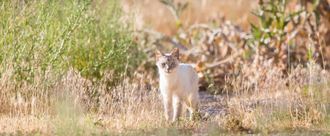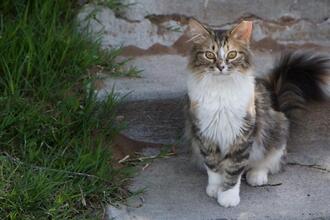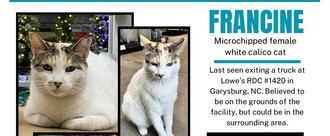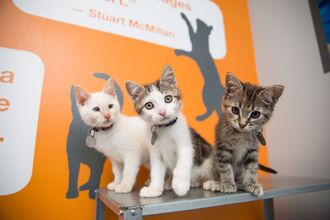-
Apoye programas de gatos comunitarios en el condado UtahLos gatos de la comunidad (también conocidos como gatos callejeros) corren el riesgo de perder la vida simplemente porque han establecido un hogar en su comunidad. Muchos de estos gatos están prosperando viviendo dentro su cominidad porque alguien en su comunidad los cuida. Alrededor de 4,300 gatos ingresan a los albergues de Utah en el 2024, y solo el 60% salieron con vida. Los estudios han demostrado que la forma más efectiva y humana de ayudar a estos gatos es a través de los programas Atrapar, Vacunar, Esterilizar y Regresar, (AVER). Los gatos comunitarios son esterilizados, vacunados, y regresados a su lugar original. Se les cortan un poco de la puntita de una oreja para identificarlos como esterilizados y devueltos a sus comunidades, sin poder tener gatitos. El enfoque tradicional de los gatos comunitarios no ha logrado ofrecer resultados duraderos. La comunidad está lista para el cambio. Ahora necesitamos defensores como tu para ayudar a la ciudad a adoptar estas soluciones que salvan vidas. Para información sobre cómo los recursos y programa AVER visita SalvaUnaMascota.org/CondadoUtah5 of 100 SignaturesCreated by Action Team

-
TNR PROGRAMS - Lake City Florida - Columbia CountyThe overpopulation of cats in Columbia County strains local shelters and poses public health concerns due to a lack of vaccinations and spay/neuter services. A rabies outbreak in the county could have devastating consequences. Florida's feral cat population is estimated to be between 6.3 million to 9.6 million. An independent review suggests a more conservative estimate of 2.7 million to 2.8 million feral cats in Florida, making up about 44% of all cats in the state. Each female feral cat can have up to three litters a year, leading to rapid population growth if not managed. The increasing feral cat population affects local businesses and the overall health and safety of the community. These programs are also proven to be the most cost-effective, veterinarian-approved, and animal-friendly solution for controlling and reducing free-roaming cat populations.220 of 300 SignaturesCreated by Laura R.

-
Jamestown leaders: There’s a better way to manage local cats!Best Friends Animal Society has offered to support them in closing the cat gap of cats being killed at the City of Jamestown to achieve a save rate of 90% or higher at no cost to taxpayers. Local leaders need to hear that the issue is important to Jamestown residents and that helping cats will help the community at large. The more signatures we can show them, the more likely they are to consider this change.57 of 100 SignaturesCreated by Action Team

-
Stop Catch and Kill of Community Cats in St Johns County Florida1. Update of the 2017 St Johns County Animal Ordinance: We request the acknowledgment and definition of: Community cats, Feral cat colony caregivers, Efforts of our coalition to trap and sterilize them and SJC animal control officers’ commitment to partnering with us out in the field. This will help our effort in the community, clarify goals and reduce the often stated “fear factor” of Animal Control expressed by the caring folks and volunteers who trying to help. Again, we want humane, cost effective and sustainable solutions to the overpopulation of these cats. 2. Utilization of existing Animal Control Resources (such as the surgery facility) to Support these Efforts: The primary challenge for the volunteers in this community is the lack of available facilities to perform the specialized hi volume spay/neuter surgeries. Our county funded Animal Control surgery facility has never been utilized to assist in this community service. St Johns County citizens in this effort must travel to Flagler, Duval and Clay counties to get these cats sterilized. This increases costs for surgery as an out-of-county resident, transportation expenses to and from appointments, time and additional stress on the animals confined to traps. We ask for your help by signing this petition and sharing it with your friends. In addition, please email all of our St Johns County Commissioners in support of our efforts and requested changes to work toward ending the outdated, unsuccessful policy of “Catch and Kill” of community cats in our county. County Commissioner emails are listed below: [email protected] Christian Whitehurst [email protected] Sarah Arnold [email protected] Clay Murphy [email protected] Krista Joseph [email protected] Ann Taylor1,071 of 2,000 SignaturesCreated by Lorie U.
-
Urgent Action to Recover Francine, the Missing Lowe’s CatTogether, we can bring Francine home. We urge Lowe’s to act with transparency, compassion, and urgency. Please add your name below to show your support and help ensure every possible step is taken for Francine’s safe return. For latest updates, check the Instagram account @WheresFrancine To find out more about how to help, visit https://tinyurl.com/WheresFrancineHowToHelpRVA #WHERESFRANCINE9,461 of 10,000 SignaturesCreated by Wheres F.
-
Tell Salem City Council: Support Lifesaving Programs for CatsIn 2024, over 4,300 cats entered Utah County shelters, and only 60% made it out alive. Community cats (aka stray or free-roaming cats) are losing their lives simply because they've made a home outdoors. In many cases, they are brought to NUVAS or SUVAS where they have a 40% chance of being killed. Many of these cats thrive living outdoors because community members care for and about them. That's where community cat programs come in. These programs use trap-neuter-vaccinate-return (TNVR) to save cats. The process is simple: Community cats are trapped, evaluated by veterinarians, vaccinated, spayed or neutered, ear-tipped, and returned to their outdoor homes, unable to have kittens. Lifesaving programs like these are proven to be the most cost-effective, veterinarian-approved, and animal-friendly solutions for improving the health of and reducing free-roaming cat populations. By aligning city ordinances with state law, Utah County can save lives, reduce taxpayer costs, and build healthier, safer communities for both people and pets. Reference the facts: Utah Code Community Cat Act 11-46-301 - https://le.utah.gov/xcode/Title11/Chapter46/C11-46-P3_1800010118000101.pdf Community cats and public health: https://www.felineresearch.org/post/issue-brief-feral-cats-and-public-health TNR and population management: https://www.felineresearch.org/post/issue-brief-what-to-do-with-feral-cats-examining-tnr Cat health and welfare with TNR: https://www.felineresearch.org/post/issue-brief-feral-cat-health5 of 100 Signatures
-
Tell Goshen City Council: Support Lifesaving Programs for CatsIn 2024, over 4,300 cats entered Utah County shelters, and only 60% made it out alive. Community cats (aka stray or free-roaming cats) are losing their lives simply because they've made a home outdoors. In many cases, they are brought to NUVAS or SUVAS where they have a 40% chance of being killed. Many of these cats thrive living outdoors because community members care for and about them. That's where community cat programs come in. These programs use trap-neuter-vaccinate-return (TNVR) to save cats. The process is simple: Community cats are trapped, evaluated by veterinarians, vaccinated, spayed or neutered, ear-tipped, and returned to their outdoor homes, unable to have kittens. Lifesaving programs like these are proven to be the most cost-effective, veterinarian-approved, and animal-friendly solutions for improving the health of and reducing free-roaming cat populations. By aligning city ordinances with state law, Utah County can save lives, reduce taxpayer costs, and build healthier, safer communities for both people and pets. Reference the facts: Utah Code Community Cat Act 11-46-301 - https://le.utah.gov/xcode/Title11/Chapter46/C11-46-P3_1800010118000101.pdf Community cats and public health: https://www.felineresearch.org/post/issue-brief-feral-cats-and-public-health TNR and population management: https://www.felineresearch.org/post/issue-brief-what-to-do-with-feral-cats-examining-tnr Cat health and welfare with TNR: https://www.felineresearch.org/post/issue-brief-feral-cat-health1 of 100 Signatures
-
Tell Genola City Council: Support Lifesaving Programs for CatsIn 2024, over 4,300 cats entered Utah County shelters, and only 60% made it out alive. Community cats (aka stray or free-roaming cats) are losing their lives simply because they've made a home outdoors. In many cases, they are brought to NUVAS or SUVAS where they have a 40% chance of being killed. Many of these cats thrive living outdoors because community members care for and about them. That's where community cat programs come in. These programs use trap-neuter-vaccinate-return (TNVR) to save cats. The process is simple: Community cats are trapped, evaluated by veterinarians, vaccinated, spayed or neutered, ear-tipped, and returned to their outdoor homes, unable to have kittens. Lifesaving programs like these are proven to be the most cost-effective, veterinarian-approved, and animal-friendly solutions for improving the health of and reducing free-roaming cat populations. By aligning city ordinances with state law, Utah County can save lives, reduce taxpayer costs, and build healthier, safer communities for both people and pets. Reference the facts: Utah Code Community Cat Act 11-46-301 - https://le.utah.gov/xcode/Title11/Chapter46/C11-46-P3_1800010118000101.pdf Community cats and public health: https://www.felineresearch.org/post/issue-brief-feral-cats-and-public-health TNR and population management: https://www.felineresearch.org/post/issue-brief-what-to-do-with-feral-cats-examining-tnr Cat health and welfare with TNR: https://www.felineresearch.org/post/issue-brief-feral-cat-health4 of 100 Signatures
-
Tell American Fork City Council: Support Lifesaving Programs for CatsIn 2024, over 4,300 cats entered Utah County shelters, and only 60% made it out alive. Community cats (aka stray or free-roaming cats) are losing their lives simply because they've made a home outdoors. In many cases, they are brought to NUVAS or SUVAS where they have a 40% chance of being killed. Many of these cats thrive living outdoors because community members care for and about them. That's where community cat programs come in. These programs use trap-neuter-vaccinate-return (TNVR) to save cats. The process is simple: Community cats are trapped, evaluated by veterinarians, vaccinated, spayed or neutered, ear-tipped, and returned to their outdoor homes, unable to have kittens. Lifesaving programs like these are proven to be the most cost-effective, veterinarian-approved, and animal-friendly solutions for improving the health of and reducing free-roaming cat populations. By aligning city ordinances with state law, Utah County can save lives, reduce taxpayer costs, and build healthier, safer communities for both people and pets. Reference the facts: Utah Code Community Cat Act 11-46-301 - https://le.utah.gov/xcode/Title11/Chapter46/C11-46-P3_1800010118000101.pdf Community cats and public health: https://www.felineresearch.org/post/issue-brief-feral-cats-and-public-health TNR and population management: https://www.felineresearch.org/post/issue-brief-what-to-do-with-feral-cats-examining-tnr Cat health and welfare with TNR: https://www.felineresearch.org/post/issue-brief-feral-cat-health8 of 100 SignaturesCreated by Karen M.
-
Tell Payson City Council: Support Lifesaving Programs for CatsIn 2024, over 4,300 cats entered Utah County shelters, and only 60% made it out alive. Community cats (aka stray or free-roaming cats) are losing their lives simply because they've made a home outdoors. In many cases, they are brought to NUVAS or SUVAS where they have a 40% chance of being killed. Many of these cats thrive living outdoors because community members care for and about them. That's where community cat programs come in. These programs use trap-neuter-vaccinate-return (TNVR) to save cats. The process is simple: Community cats are trapped, evaluated by veterinarians, vaccinated, spayed or neutered, ear-tipped, and returned to their outdoor homes, unable to have kittens. Lifesaving programs like these are proven to be the most cost-effective, veterinarian-approved, and animal-friendly solutions for improving the health of and reducing free-roaming cat populations. By aligning city ordinances with state law, Utah County can save lives, reduce taxpayer costs, and build healthier, safer communities for both people and pets. Reference the facts: Utah Code Community Cat Act 11-46-301 - https://le.utah.gov/xcode/Title11/Chapter46/C11-46-P3_1800010118000101.pdf Community cats and public health: https://www.felineresearch.org/post/issue-brief-feral-cats-and-public-health TNR and population management: https://www.felineresearch.org/post/issue-brief-what-to-do-with-feral-cats-examining-tnr Cat health and welfare with TNR: https://www.felineresearch.org/post/issue-brief-feral-cat-health39 of 100 Signatures
-
Tell Orem City Council: Support Lifesaving Programs for CatsIn 2024, over 4,300 cats entered Utah County shelters, and only 60% made it out alive. Community cats (aka stray or free-roaming cats) are losing their lives simply because they've made a home outdoors. In many cases, they are brought to NUVAS or SUVAS where they have a 40% chance of being killed. Many of these cats thrive living outdoors because community members care for and about them. That's where community cat programs come in. These programs use trap-neuter-vaccinate-return (TNVR) to save cats. The process is simple: Community cats are trapped, evaluated by veterinarians, vaccinated, spayed or neutered, ear-tipped, and returned to their outdoor homes, unable to have kittens. Lifesaving programs like these are proven to be the most cost-effective, veterinarian-approved, and animal-friendly solutions for improving the health of and reducing free-roaming cat populations. By aligning city ordinances with state law, Utah County can save lives, reduce taxpayer costs, and build healthier, safer communities for both people and pets. Reference the facts: Utah Code Community Cat Act 11-46-301 - https://le.utah.gov/xcode/Title11/Chapter46/C11-46-P3_1800010118000101.pdf Community cats and public health: https://www.felineresearch.org/post/issue-brief-feral-cats-and-public-health TNR and population management: https://www.felineresearch.org/post/issue-brief-what-to-do-with-feral-cats-examining-tnr Cat health and welfare with TNR: https://www.felineresearch.org/post/issue-brief-feral-cat-health12 of 100 Signatures
-
Tell Lehi City Council: Support Lifesaving Programs for CatsIn 2024, over 4,300 cats entered Utah County shelters, and only 60% made it out alive. Community cats (aka stray or free-roaming cats) are losing their lives simply because they've made a home outdoors. In many cases, they are brought to NUVAS or SUVAS where they have a 40% chance of being killed. Many of these cats thrive living outdoors because community members care for and about them. That's where community cat programs come in. These programs use trap-neuter-vaccinate-return (TNVR) to save cats. The process is simple: Community cats are trapped, evaluated by veterinarians, vaccinated, spayed or neutered, ear-tipped, and returned to their outdoor homes, unable to have kittens. Lifesaving programs like these are proven to be the most cost-effective, veterinarian-approved, and animal-friendly solutions for improving the health of and reducing free-roaming cat populations. By aligning city ordinances with state law, Utah County can save lives, reduce taxpayer costs, and build healthier, safer communities for both people and pets. Reference the facts: Utah Code Community Cat Act 11-46-301 - https://le.utah.gov/xcode/Title11/Chapter46/C11-46-P3_1800010118000101.pdf Community cats and public health: https://www.felineresearch.org/post/issue-brief-feral-cats-and-public-health TNR and population management: https://www.felineresearch.org/post/issue-brief-what-to-do-with-feral-cats-examining-tnr Cat health and welfare with TNR: https://www.felineresearch.org/post/issue-brief-feral-cat-health7 of 100 Signatures












